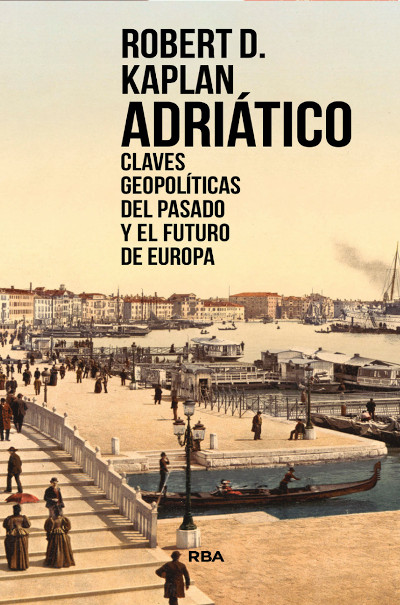In the picture
Cover of the book by Robert D. Kaplan 'Adriatic. Geopolitical keys to Europe's past and future' (Barcelona: RBA, 2022) 416 p.
Robert Kaplan's latest book, Considerations on the Adriatic Sea environment, marks the author's trajectory towards a greater intellectualism, present in previous works but which this time moves him further away from the journalistic reportage -certainly illustrated or cultured- habitual in his travel books and in his other deliveries in which geopolitical considerations are always distilled. The subtitle chosen for the Spanish edition, "Claves geopolíticas del pasado y el futuro de Europa" (Geopolitical Keys to Europe's Past and Future), may lead to frustration among readers who expect a typical essay . The subtitle of the original English edition - "A Concert of Civilizations at the End of the Modern Age"- better indicates the tone of the interior pages. This time Kaplan remains more in the past: the past is no longer so much the starting point for addressing present issues and their future projection, as the object of interest itself, although the author also points here to cultural imperatives that are perpetuated in time.
It is possible that Kaplan has the feeling that once the substance of how geography conditions geopolitics has been said (there are his more general compositions of 'The Revenge of Geography' or 'The Return to the World of framework Polo', but also his regional approaches of 'Monsoon', 'Asia's Cauldron' or 'Balkan Ghosts') there is not much more to say at that level of knowledge and he wants to devote himself to more singular and deeper tastings.
How to deal with the "overwhelming vision" of the current geopolitical confrontation, he asks. And he answers: "By going local rather than global. By delving into the historical and aesthetic peculiarities of each site, rather than losing the texture in some bland, abstract, formulaic, global approach." "Macro vision requires a granular knowledge base," he adds. And he explains his greatest amusement this time in the past: "After all, ruins are much more interesting than what is obvious and above ground. Only ruins can put into perspective what is in plain sight."
And a final note on form, for in 'Adriatic' there is an insistence on referring to readings that preceded, accompanied and followed the author's travels between 2016 and 2018. "Travel leads to books and good books lead you to other good books. And so, I have become an obsessive reader of bibliographies." The work, then, is a compendium of personal experiences, readings and bibliographical references, recalling the character of the famous 'Danube', by Claudio Magris, with whom Kaplan meets in Trieste in his recounted visit to the former port of the Austro-Hungarian Empire.
It is precisely the chapter centered on Trieste, dedicated to the "geographical complexity" of Italy, which is the most reminiscent of the author's previous approaches, although the book contains useful considerations for understanding the geopolitical conditioning factors that explain the behavior of the nations that have followed. It is a journey that begins in Rimini, continues through Ravenna and Venice and then travels along the eastern coast of the Adriatic, from Slovenia to the Greek island of Cofu, opposite the Albanian border. Kaplan's reflections take particular account of what happened in this geographical space in the modern era, when the Adriatic Sea was the gateway to the Ottoman and Austrian-Hungarian empires. "The Adriatic defines Central and Eastern Europe as much as the Baltic and the Black Sea do."
"Truly, the Adriatic is becoming a bottleneck of international trade and geopolitical interests," says Kaplan. But instead of "theorizing" about the return of China and Russia to great power status, the author follows the "opposite" path: "So, just as the Adriatic is about to achieve a new global relevance, I have decided to use it as a geographical metaphor for an era we are living through: the Modern Age in Europe. Only by understanding what is happening can we better analyze what is to come".

